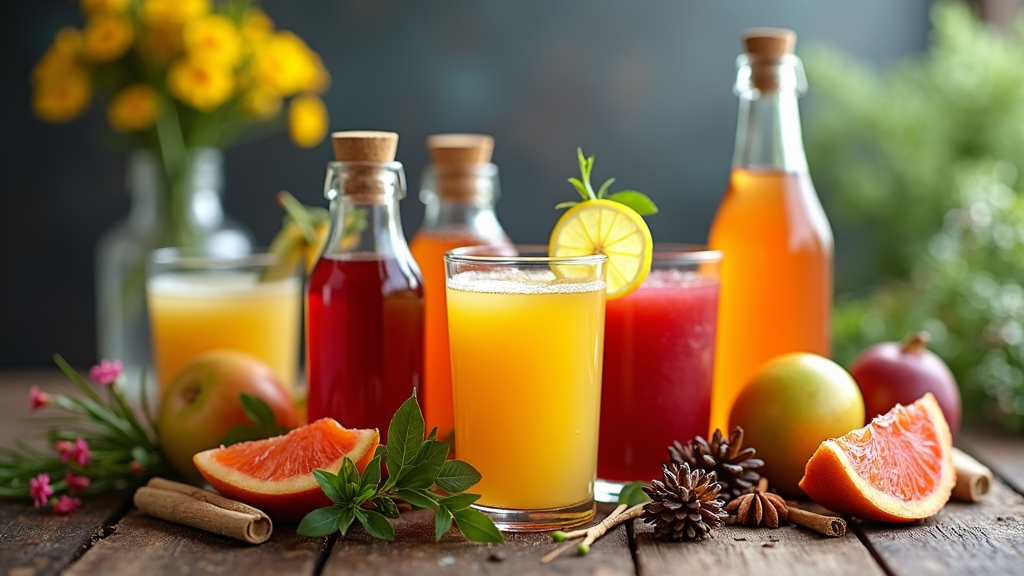Crafting Easter cocktails using delicious homemade syrups and infusions for a festive twist at your gatherings!
Welcome to Shake, Sip, Serve, your one-stop shop for all things bartending.
I’m your host, KAD, and I’ve been slinging drinks and navigating the world of hospitality for over two decades.
The past 15 years, I’ve perfected my bartending skills, experimented with countless flavor combinations, and learning a thing or two about how to keep the party going behind the bar.
Whether you’re a seasoned bartender like me just looking for some fresh inspiration or a complete beginner who is eager to whip up impressive cocktails at home, Shake, Sip, Serve is here to be your guide.
In the below blog, I’ll be sharing my knowledge and experience on everything from classic cocktails and innovative new creations to essential bartending techniques and industry secrets. I’ll also be offering tips on stocking your home bar, mastering the art of presentation, and creating a memorable experience for your guests.
So, grab your shaker, dust off your favorite glassware, and get ready to embark on a delicious journey into the world of bartending!
Let’s Shake, Sip, and Serve up something amazing together.
Disclaimer: This post contains affiliate links. If you purchase through these links, I may earn a small commission at no additional cost to you.
Creating cocktails with a personal twist during Easter boosts the festive spirit and brings creativity to a whole new level. Homemade syrups and infusions let you mix flavors that reflect the fresh season, turning simple drinks into artful treats. In this article, I share ideas and tips focused on crafting Easter cocktails using your own homemade ingredients. Whether you are hosting a small gathering or experimenting in your kitchen, these ideas can spark inspiration.

Essential Ingredients and Tools for Easter Cocktail Crafting
The heart of any cocktail lies in its ingredients and the tools used to create them. When it comes to making Easter cocktails, homemade syrups and infusions take your drink game up a notch. Fresh herbs, fruits, and spices are the building blocks of these syrups and infusions, ensuring that every sip carries the season’s bright, natural flavors.
For beginners a clear idea of what to use is a great starting point. Common elements include citrus fruits like lemons and oranges, fresh herbs such as mint or basil, and aromatic spices like cinnamon. Each ingredient can be mixed in various combinations to create something tart, sweet, or pleasantly spicy.
A few essential tools include a good saucepan, a storage jar, a cocktail shaker, and strainers. With these simple items, you can experiment with flavors at home without needing expensive equipment. Plus, the process can be as fun as the final drink.
Getting Started with DIY Syrups and Infusions
Before you jump into mixing cocktails, it is important to understand the basics of creating homemade syrups and infusions. Unlike store-bought versions that often use high sugar levels or artificial flavors, homemade versions let you control the intensity and balance of your drinks.
Start with a simple syrup recipe: equal parts water and sugar brought to a gentle boil. Add flavor agents like fresh lemon zest, vanilla beans, or seasonal herbs. Let the mixture simmer so the flavors meld together and then cool it before adding to your cocktails.
Infusions work similarly, but they use alcohol as a base. Choose a high-quality spirit that compliments your chosen flavors. Add fruits, herbs, or spices to the spirit and let it steep in a sealed jar for several days. Over time, the spirit takes on new flavors that give your cocktail a unique profile.
Overcoming Common Challenges in Homemade Mixology
Like any DIY project, making syrups and infusions comes with its challenges. Balancing sweetness is one common hurdle. Too much sugar can mask natural flavors, while too little might leave your cocktail tasting flat. Tasting your syrup at different stages and making small batches can help avoid waste while refining the balance.
Another pitfall is the extraction of flavors. Over-steeping herbs or spices may lead to bitterness, especially when alcohol is involved. It helps to follow recommended steeping times and be cautious with strong ingredients; for instance, a sprig of rosemary left in the spirit for too long can dominate the flavor, so a few hours is often enough for subtle notes.
Proper storage also plays an important role. Refrigerating syrups and infusions in sterilized jars not only preserves the flavors but also extends their life, allowing you to enjoy your creations for several weeks.
Advanced Tips and Tricks for Easter Cocktail Creativity
Once you’re comfortable with the basics of homemade syrups and infusions, it’s time to experiment with advanced techniques to give your Easter cocktails a special twist. An exciting option is the use of layered flavors. Combining two or three flavors in one drink can create an unexpected depth. For example, layering a fruity syrup with an herb-based infusion, such as a basil-infused simple syrup mixed with a blueberry reduction, adds a fresh and springy twist.
Playing with temperature and texture is another fun trick. Chilled infusions, frozen syrups, or adding ice spheres can make your cocktails both visually appealing and refreshing. Experiment with different garnish options too. Instead of traditional citrus wheels, consider edible flowers or herb sprigs that hint at the flavors in the drink. Each detail, from glass to garnish, contributes to a complete and enjoyable cocktail experience.
If you enjoy putting a personal spin on classic recipes, try swapping a store-bought syrup for your homemade version. The satisfaction of creating an element of your drink is very important. This mix-up from conventional recipes lets you define your own style in mixology.
The Basics: Key Ingredients to Step Up Your Mixology
When mixing cocktails, the ingredients you choose set the stage for a balanced drink. I always start by selecting seasonal items that embody the Easter theme. Fresh berries, citrus fruits, and spring herbs bring not only taste but also a festive look to your cocktails.
Consider these key ingredients for homemade syrups and infusions:
- Citrus Fruits: Lemons, limes, and oranges add brightness. Zesting these fruits during syrup preparation releases essential oils that enrich the overall flavor.
- Herbs and Flowers: Mint, basil, and edible flowers like violets or dandelions deliver a light quality and visual appeal.
- Spices: Cinnamon, star anise, or cloves offer a warm note that contrasts with the tang of citrus or the freshness of herbs.
- Fruits: Fresh berries, apples, or peaches add natural sweetness and color. They can be pureed or sliced to best capture their flavor.
- Quality Spirits: For infusions, starting with a good-quality spirit ensures a smooth, well-rounded base for your cocktail.
Balancing these ingredients can create cocktails that are complex yet not overwhelming. Try different proportions until you find the mix that suits your taste.
Frequently Asked Questions
People new to crafting cocktails often have similar questions. Here are a few common ones:
Question: How do I know the right proportion of ingredients for my syrup?
Answer: Use equal measures of water and sugar as a starting point, then gradually add your flavor agents while tasting to adjust as needed.
Question: Can I store my homemade syrups and infusions for later use?
Answer: Yes, most homemade syrups will last up to a month in the refrigerator. Infusions with alcohol can last even longer if kept in sterilized bottles.
Question: What are the best fruits and herbs to use for an Easter theme?
Answer: Seasonal items such as berries, citrus fruits, mint, basil, and edible flowers work well, adding both taste and a vibrant visual touch.
Question: Are there any shortcuts for beginners in making infusions?
Answer: If you’re short on time, you can start with quick infusions by letting your herbs or fruits steep for just a few hours. This gives a noticeable flavor boost without waiting days.
Conclusion
Homemade syrups and infusions have opened up a new world for cocktail lovers, especially during festive times like Easter. Crafting your own ingredients lets you control the sweetness, balance, and depth of flavor in every cocktail. The process is enjoyable and gives you the freedom to experiment with creative combinations.
From gathering seasonal ingredients to refining your recipes through trial and error, every step contributes to a personal mixology adventure. Layered flavors, unique garnishes, and varied textures can transform a simple drink into something remarkable that captures the spirit of the season.
Start with small batches and gradually experiment with new combinations. With proper storage and a willingness to adjust recipes as you learn, your homemade cocktails will not only taste delightful but also become a cherished part of your Easter celebrations.
This creative process is more than just about making a tasty beverage. It’s about celebrating the season, adding your signature touch, and enjoying every sip. Happy Easter cocktail crafting!
Thanks for joining us behind the bar!
The bartending community is a vibrant and supportive one, and I’m excited to build that community here on Shake, Sip, Serve. I’d love to hear your thoughts, questions, and experiences in the comments below. What are you shaking up these days? What topics would you like to see covered in future posts? Let’s connect and continue the conversation!
Liquor & Gaming NSW: This website provides information on liquor licensing, responsible service of alcohol (RSA) training, and regulations for serving alcohol in NSW. It’s essential for anyone working in the hospitality industry in NSW. You can find it here: https://www.liquorandgaming.nsw.gov.au/
Read more:
10 Easter-Inspired Cocktails You Have To Try This Spring
Hosting An Easter Cocktail Brunch: Recipes And Tips
Unique Easter-Themed Garnishes For Your Bar
How To Create An Egg-citing Easter Bar Menu
Easter Celebration: Pairing Cocktails With Traditional Dishes
Non-Alcoholic Easter Mocktails For All Ages
Spring Fizz: The Perfect Easter Cocktail Punch
Floral And Fresh: Botanical Cocktails For Easter
Crafting Easter Cocktails Using Homemade Syrups And Infusions
Traditional Meets Modern: Easter Classics With A Cocktail Twist

To be successful making cocktails you clearly have to be very careful to get the basics right! I guess this is an area where practice is very much a necessary requirement towards the “making perfect” side of the equation. Still, it sounds exciting how you can achieve different outcomes in the nature and flavor of your syrups and infusions, just by how you steep, the length of time you steep and of course, your selection of fruits, herbs and spices.
I imagine the experimentation you do must produce some very interesting results. I wonder how easy it is to exactly replicate a cocktail you really enjoy by using the same ingredients and following the exact same procedure. Is it completely reliable in producing the results you’re looking for, or do you still get some variations in the sweetness/ bitterness and flavor of the finished cocktail?
Practice is definitely key in cocktail making! It’s true that even with exact ingredients and procedures, some subtle variations can occur. Factors like fruit ripeness, temperature, and even the vigor of a shake can slightly alter the final balance of sweetness, bitterness, and overall flavor.
I love how this article encourages creativity with homemade syrups and infusions. It adds such a personal and flavorful touch to Easter cocktails. It’s a great reminder that festive drinks can be just as fun to make as they are to sip. Have you tried infusing with seasonal herbs like rosemary or lavender for a spring twist?
It really does make a difference in adding a unique and personal touch to cocktails, especially for festive occasions.
And yes, infusing with seasonal herbs like rosemary or lavender for a spring twist is a fantastic idea! Rosemary brings a lovely aromatic and slightly piney note that pairs well with gin or vodka, while lavender offers a delicate floral essence that can be beautiful in lighter, refreshing drinks.